UNDERSTANDING COLON CANCER.
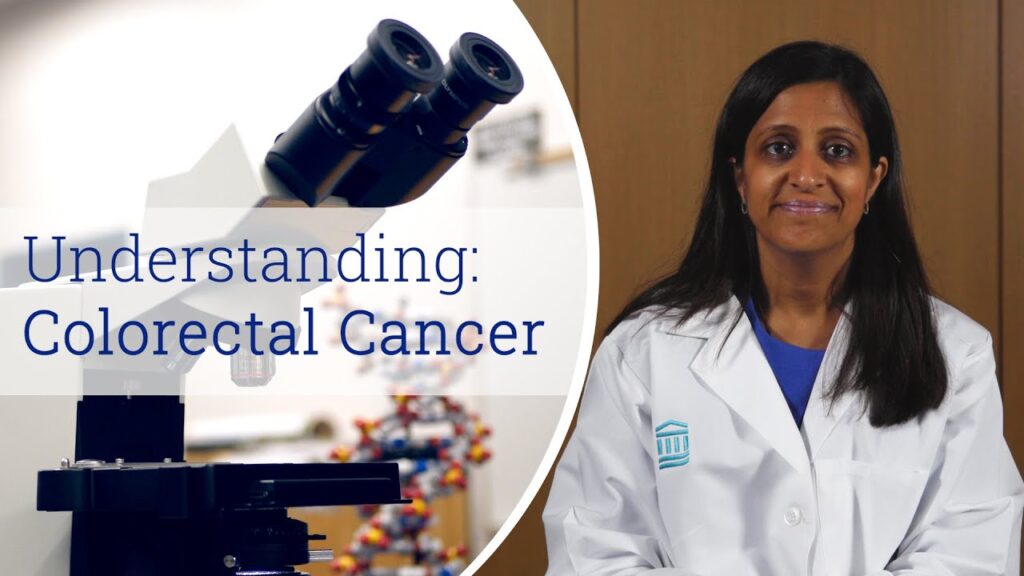
Colon cancer, a prevalent form of cancer, affects thousands of people each year. Understanding its symptoms, causes, and risk factors is crucial for early detection and effective prevention. This article aims to provide a comprehensive overview of colon cancer, using clear language and focusing on essential aspects to help increase awareness and support proactive health measures.
WHAT IS COLORECTAL CANCER?
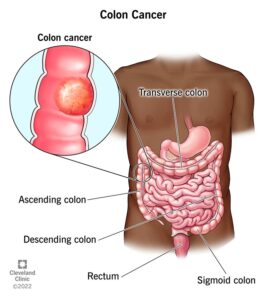
Colon cancer, also known as colorectal cancer, originates in the colon or rectum. The colon, or large intestine, is the final part of the digestive system, and the rectum is the section that connects the colon to the anus. Colorectal cancer begins when cells in these areas grow uncontrollably, forming tumours.
Colon cancer usually starts as polyps, which are small growths on the lining of the colon or rectum. While most polyps are benign (non-cancerous), some can develop into cancer over time. Early detection and removal of these polyps can significantly reduce the risk of colon cancer.
COMMON SYMPTOMS OF COLON CANCER
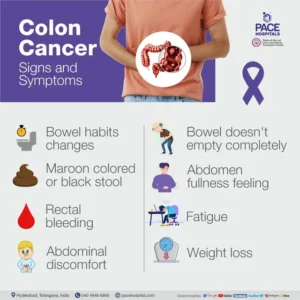
Recognizing the symptoms of colorectal cancer is essential for early diagnosis and treatment. Initially, colorectal cancer may not present any noticeable symptoms, especially in its early stages. However, as the disease progresses, several symptoms may arise, one of the most common symptoms is :
changes in bowel habits. This can include persistent diarrhoea, constipation, or a change in the consistency of stool. Additionally, individuals may notice blood in their stool or experience rectal bleeding, which should be evaluated by a healthcare provider.
Abdominal discomfort: This is another symptom , such as cramping or persistent pain. This discomfort might be accompanied by bloating or a feeling of fullness in the abdomen.
Furthermore, unexplained weight loss and fatigue can also be indicative of colon cancer. As the disease advances, these symptoms may become more pronounced, impacting overall health and quality of life. It is important to note that these symptoms can also be caused by other conditions, such as haemorrhoids or irritable bowel syndrome. Therefore, experiencing any of these symptoms warrants a medical evaluation to determine the underlying cause.
CAUSES OF COLON CANCER
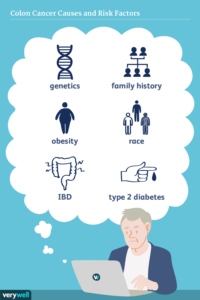
Colorectal cancer, like many cancers, is caused by a combination of genetic and environmental factors.
Genetic mutations: It plays a significant role in the development of colon cancer. These mutations can occur spontaneously or be inherited from family members. In addition to genetic factors, several environmental factors contribute to the risk of developing colon cancer.
Dietary choices: dietary choices are a major factor. Diets high in red and processed meats, and low in fibre, can increase the risk of colon cancer. Conversely, a diet rich in fruits, vegetables, and whole grains may help lower the risk.
Lifestyle choices: This also play a critical role in colon cancer development. For instance, a sedentary lifestyle and lack of regular physical activity can contribute to an increased risk of colon cancer. Regular exercise is beneficial for maintaining a healthy weight and reducing cancer risk.
Moreover, chronic conditions such as inflammatory bowel disease (IBD), including Crohn’s disease and ulcerative colitis, can increase the risk of colon cancer. These conditions cause long-term inflammation and irritation of the colon, which can lead to cancerous changes over time.
RISK FACTORS FOR COLON CANCER
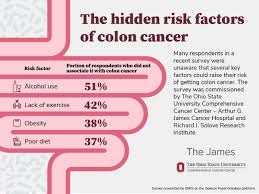
Understanding the risk factors associated with colorectal cancer can help in identifying individuals who may be more likely to develop the disease.
Age: This is one of the primary risk factors. Colon cancer is more common in individuals over the age of 50, although it can occur in younger people, especially those with other risk factors.
Family history is another significant risk factor. Individuals with a family history of colon cancer or polyps are at a higher risk of developing the disease. Genetic conditions such as familial adenomatous polyposis (FAP) and Lynch syndrome also increase the likelihood of colon cancer. Those with a family history of these genetic conditions should be monitored more closely.
Diet and lifestyle choices further influence colon cancer risk. As mentioned earlier, diets high in red and processed meats are associated with a higher risk. On the other hand, a diet rich in fiber, vitamins, and minerals can be protective. Additionally, smoking and excessive alcohol consumption are linked to an increased risk of colon cancer.
Obesity is another critical factor. Excess body weight, particularly around the abdomen, is associated with a higher risk of developing colon cancer. Maintaining a healthy weight through balanced nutrition and regular physical activity can help mitigate this risk.
Regular screening is crucial for those at higher risk. Screening tests, such as colonoscopies, can detect polyps and early-stage cancer, improving the chances of successful treatment. Individuals with risk factors should discuss a suitable screening schedule with their healthcare provider.
CONCLUSION.
Colorectal cancer is a serious disease that requires awareness and proactive management. Understanding the symptoms, causes, and risk factors associated with colon cancer is essential for early detection and prevention. By recognizing common symptoms such as changes in bowel habits, abdominal discomfort, and unexplained weight loss, individuals can seek timely medical evaluation.
In addition to recognizing symptoms, understanding the causes of colorectal cancer, including genetic mutations and environmental factors, is crucial. Making healthy lifestyle choices, such as maintaining a balanced diet, engaging in regular physical activity, and avoiding smoking and excessive alcohol consumption, can help reduce the risk of colon cancer.
Moreover, awareness of risk factors such as age, family history, and chronic conditions is important. Regular screening and early intervention can play a significant role in detecting colorectal cancer at an early stage, leading to more effective treatment and better outcomes.
By staying informed and taking proactive measures, individuals can significantly reduce their risk of colorectal cancer and improve their overall health. Consulting with healthcare providers about personalized risk factors and appropriate screening options is an essential step in managing colon cancer risk.
REFERENCES:
- American Cancer Society. (n.d.). Colon and Rectal Cancer. Retrieved from American Cancer Society
- National Cancer Institute. (n.d.). Colorectal Cancer. Retrieved from National Cancer Institute
- U.S. Preventive Services Task Force. (n.d.). Colorectal Cancer Screening. Retrieved from USPSTF
- Mayo Clinic. (n.d.). Colon Cancer. Retrieved from Mayo Clinic
Written by Fawzi Rufai, Medically Reviewed by Sesan Kareem